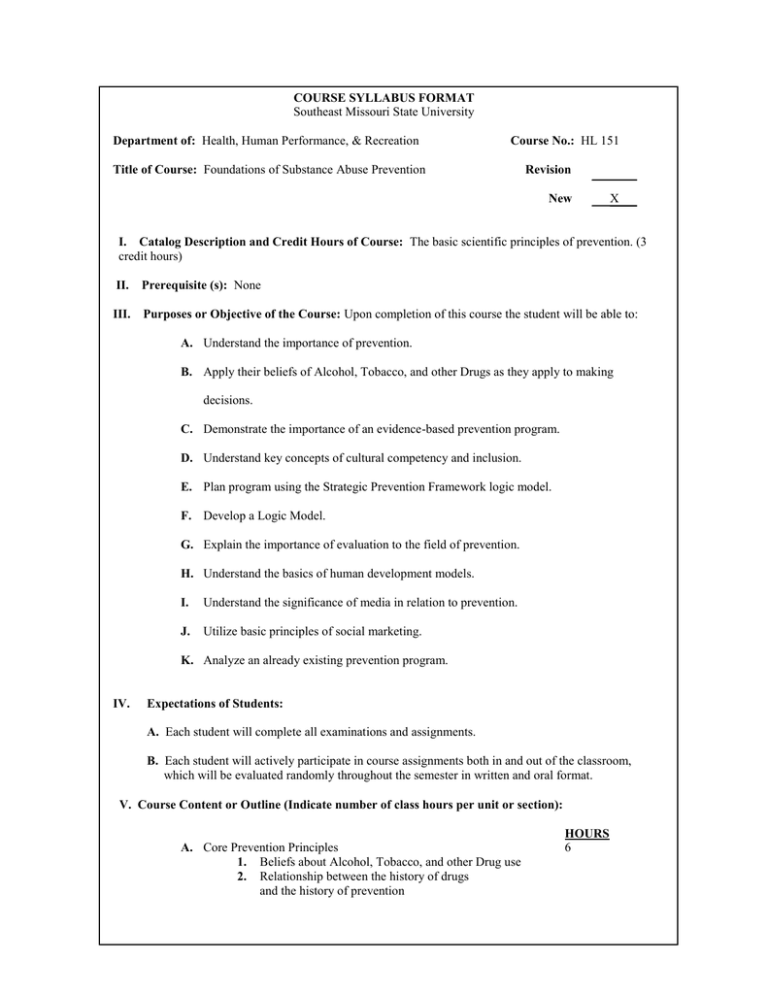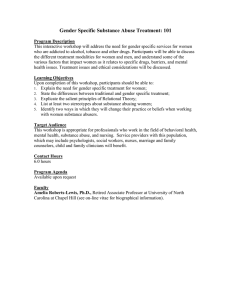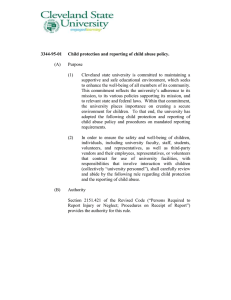HL151
advertisement

COURSE SYLLABUS FORMAT Southeast Missouri State University Department of: Health, Human Performance, & Recreation Course No.: HL 151 Title of Course: Foundations of Substance Abuse Prevention Revision New X I. Catalog Description and Credit Hours of Course: The basic scientific principles of prevention. (3 credit hours) II. Prerequisite (s): None III. Purposes or Objective of the Course: Upon completion of this course the student will be able to: A. Understand the importance of prevention. B. Apply their beliefs of Alcohol, Tobacco, and other Drugs as they apply to making decisions. C. Demonstrate the importance of an evidence-based prevention program. D. Understand key concepts of cultural competency and inclusion. E. Plan program using the Strategic Prevention Framework logic model. F. Develop a Logic Model. G. Explain the importance of evaluation to the field of prevention. H. Understand the basics of human development models. I. Understand the significance of media in relation to prevention. J. Utilize basic principles of social marketing. K. Analyze an already existing prevention program. IV. Expectations of Students: A. Each student will complete all examinations and assignments. B. Each student will actively participate in course assignments both in and out of the classroom, which will be evaluated randomly throughout the semester in written and oral format. V. Course Content or Outline (Indicate number of class hours per unit or section): A. Core Prevention Principles 1. Beliefs about Alcohol, Tobacco, and other Drug use 2. Relationship between the history of drugs and the history of prevention HOURS 6 3. Prevention Code of Ethics B. Theoretical Approaches 4. Evidence-based Prevention 5. Risk and Protective Factors Theory 6. Resiliency Approach 7. Developmental Assets Model 8. National Institutes on Drug Abuse Prevention Principles 9 C. Culture and Diversity 9. Cultural Competence and Inclusion 10. Attitudes and Values about Substance Use and Abuse 3 D. Strategic Prevention Framework (SPF) 11. Stages of the Prevention Framework 12. Logic model in the context of planning 13. Sustainability 6 E. Evaluation 14. Importance of Evaluation Methods 15. Using the Logic Model to assist Evaluation 16. Stakeholders and the evaluation process 3 F. Human Development 9 17. Maslow’s Hierarchy of Needs Theory 18. Piaget’s Theory of Human Development 19. Bandura’s Social Learning Theory 20. Patterns of Life Changes in relation to moral, emotional and social development 21. Structural and Functional changes that occur in Adolescent Brain Development 22. Effects of Alcohol, Tobacco, and other Drugs on the Adolescent Brain G. Social Norming 23. Significance of Media in Prevention 24. Media Advocacy Principles 25. Alcohol and Tobacco Advertisement Analysis 26. Basic Principles of Social Marketing 6 H. On-line Prevention Assessment 27. Prevention certifications 28. Center for Substance Abuse Prevention’s Foundations Prevention course 3 Total Hours = 45 VI. Textbook(s) and/or Other Required Materials or Equipment: Required Text Wilson, R. & Kolander, C. (2003). Drug Abuse Prevention: A School & Community Partnership. 3rd Ed. Jones and Bartlett Publishers. Supplementary Text (available through NIDA) National Institute on Drug Abuse (2003). Prevention Drug Use among Children and Adolescents, a Research-Based Guide for Parents, Educators, and Community Leaders. 2nd Ed. NIDA Publication No. 04-4212(A). VII. Basis for Student Evaluation: 50% 20% 20% 10% Examinations Research Project: Paper and presentation of one scientific health behavior theory and it’s relation to substance abuse prevention Completion of Center of Substance Abuse Prevention’s Foundations of Prevention on-line course Quizzes and homework assignments The weight of evaluation criteria may vary at the discretion of the instructor and will be indicated at the beginning of each course. A=90-100% B=80-89% C=70-79% D=60-69% F=59% & below



